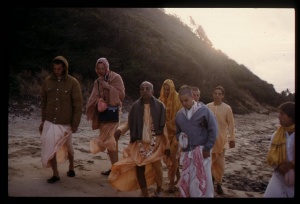SB 6.14.4

A.C. Bhaktivedanta Swami Prabhupada
TEXT 4
- prāyo mumukṣavas teṣāṁ
- kecanaiva dvijottama
- mumukṣūṇāṁ sahasreṣu
- kaścin mucyeta sidhyati
SYNONYMS
prāyaḥ — almost always; mumukṣavaḥ — persons interested in liberation; teṣām — of them; kecana — some; eva — indeed; dvija-uttama — O best of the brāhmaṇas; mumukṣūṇām — of those who desire to be liberated; sahasreṣu — in many thousands; kaścit — someone; mucyeta — may be actually liberated; sidhyati — someone is perfect.
TRANSLATION
O best of the brāhmaṇas, Śukadeva Gosvāmī, out of many persons who follow religious principles, only a few desire liberation from the material world. Among many thousands who desire liberation, one may actually achieve liberation, giving up material attachment to society, friendship, love, country, home, wife and children. And among many thousands of such liberated persons, one who can understand the true meaning of liberation is very rare.
PURPORT
There are four classes of men, namely karmīs, jñānīs, yogīs and bhaktas. This statement pertains especially to karmīs and jñānīs. A karmī tries to he happy within this material world by changing from one body to another. His objective is bodily comfort, either in this planet or in another. When such a person becomes a jñānī, however, be aspires for liberation from material bondage. Among many such persons who aspire for liberation, one may actually be liberated during his life. Such a person gives up his attachment for society, friendship, love, country, family, wife and children. Among many such persons, who are in the vānaprastha stage, one may understand the value of becoming a sannyāsī, completely accepting the renounced order of life.